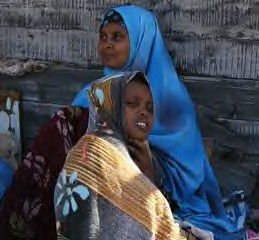
Somali civilians have suffered much as a result of the US political and military interference in their country., a photo by Pan-African News Wire File Photos on Flickr.
Somali refugees fight cholera and measles as hunger spreads
Camps and hospitals are struggling to cope with the outbreak as more than 180 people die from disease
Xan Rice guardian.co.uk,
Saturday 13 August 2011 23.20 BST
Outbreaks of measles and cholera are striking down Somali children already weakened by hunger, resulting in dozens of new fatalities. News of the fast-spreading diseases has caused alarm among aid workers, who are struggling to deal with the humanitarian crisis brought on by the severe drought and conflict in Somalia.
Hundreds of thousands of people have fled into overflowing refugee camps in recent months in search of food and sanctuary, but many more remain in rebel-held famine zones where aid agencies have only limited access.
The World Health Organisation said on Friday that Somalia was experiencing a cholera epidemic. Linked to dirty water, poor sanitation and crowded settlements, the intestinal infection causes dehydration and is often fatal.
In just one hospital in Mogadishu, there have been 4,272 recorded cases of acute watery diarrhoea, a key indicator of the risk of cholera, causing 181 deaths. Most of those who have died were aged under five. Laboratory tests conducted on a sample of the cases this week suggested 60% of the infections were cholera.
While Somalia has experienced seasonal cholera outbreaks in recent years, this one is much worse. "The number of cases is two or even three times what was there last year," Dr Michel Yao, WHO's public health adviser, said in Geneva on Friday. "So we can say that we have an epidemic of cholera going on."
Yao said that the risk of the disease spreading was high since people were still moving around in search of food aid. At least 100,000 Somalis have fled to Mogadishu from the countryside in the last two months. An even greater number have travelled to sprawling drought-affected refugee camps in Kenya and Ethiopia. In Kenya's Dadaab settlement, about 1,400 Somalis arrive every day, pushing the number of recorded refugees past 400,000. A further 38,000 people still await registration.
With the three Dadaab camps overflowing, most of the new arrivals have been forced to settle on the outskirts, far from latrines and water points. Aid workers say that unless these families are moved to more suitable areas before the next rains, fresh cholera outbreaks are likely. The UN refugee agency (UNHCR) says it hopes to move 90,000 of the refugees to better-equipped settlements in Dadaab before November, though the plans are dependent on permission from Kenya, which has complained repeatedly about the burden of hosting so many Somalis.
Meanwhile at the Dollo Ado refugee camps in south-eastern Ethiopia, home to nearly 120,000 Somali refugees, government health officers and aid workers conducted an urgent measles vaccination campaign this week. UNHCR said that 93 cases of measles had been recorded in the camps, with three deaths officially confirmed. But the real toll may be significantly higher. Community health workers reported that around a dozen people had died of measles on a single day earlier this month, UNHCR said.
Normally measles is not life-threatening. But when children are severely malnourished – as many of the recent Somali arrivals are – it can be fatal.
While numbers are difficult to confirm, the UN estimates that tens of thousands of Somalis have died this year of hunger-related causes.
Famine conditions exist in two large regions of Somalia, as well as three smaller areas, including parts of Mogadishu where there are large concentrations of displaced people. Other regions of southern Somalia are expected to be declared famine zones in the next month or two.
The aid effort in Mogadishu was eased slightly last week when most of the al-Shabab militias withdrew following an offensive by African Union troops and pro-government forces. The Islamists claimed that the move was strategic, and said their fighters would adopt guerrilla tactics from now on rather than trying to hold ground in Mogadishu against the better-equipped AU peacekeepers.
But the rebels have been rocked by divisions due to their handling of the food crisis. Some of the hardline leaders, who come from the north of Somalia, have denied there is a famine in the south and refused to lift a ban on organisations such as the World Food Programme, the agency best equipped to manage a hunger emergency. This has angered local al-Shabab leaders, who want the people to receive help, even if it comes from the west. Interviews with refugees suggest that the rebels' restrictions on aid, as well as their policy of taking food and animals as "taxes", has eroded whatever support they may once have enjoyed.
Despite the withdrawal from Mogadishu, the Islamists still control much of southern Somalia, including the main famine zones.
© 2011 Guardian News and Media Limited or its affiliated companies. All rights reserved.
No comments:
Post a Comment